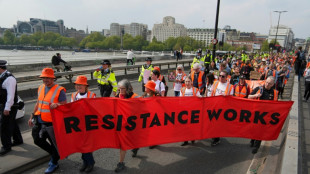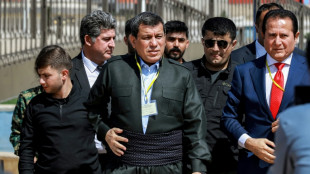-
 Denkey wonder-strike keeps Cincinnati on track in MLS
Denkey wonder-strike keeps Cincinnati on track in MLS
-
Barca edge Real Madrid in extra-time to win wild Copa del Rey final

-
 'Legendary' Eubank Jr beats Benn in grudge bout
'Legendary' Eubank Jr beats Benn in grudge bout
-
Thunder sweep past Grizzlies into NBA playoffs 2nd round, Cavs on brink

-
 South Korea's Ryu and Japan's Saigo share LPGA Chevron lead
South Korea's Ryu and Japan's Saigo share LPGA Chevron lead
-
Canada leaders make closing pitches in campaign upended by Trump

-
 De Bruyne's Man City exit 'so difficult' for Guardiola
De Bruyne's Man City exit 'so difficult' for Guardiola
-
'No regrets' for Amorim over Man Utd move

-
 Lyon and Strasbourg win to close in on Europe, Montpellier relegated from Ligue 1
Lyon and Strasbourg win to close in on Europe, Montpellier relegated from Ligue 1
-
Toulouse thrash Castres as Top 14 pursuers stumble

-
 Djokovic crashes to nervous Arnaldi in Madrid opener, Swiatek advances
Djokovic crashes to nervous Arnaldi in Madrid opener, Swiatek advances
-
Olympic champs Russell, Davis-Woodhall win at Drake Relays

-
 Browns end Sanders long draft slide
Browns end Sanders long draft slide
-
Cavs crush Heat, on brink of NBA playoff sweep

-
 Fire rages after major blast at Iran port kills 8, injures hundreds
Fire rages after major blast at Iran port kills 8, injures hundreds
-
Kiwi Beamish wins Penn Relays 1,500m crown with late kick

-
 Mbappe on Real Madrid bench for Clasico Copa del Rey final
Mbappe on Real Madrid bench for Clasico Copa del Rey final
-
England survive France fightback to seal Women's 6 Nations slam

-
 Palace sweep past Villa to reach FA Cup final
Palace sweep past Villa to reach FA Cup final
-
CAF appoint Moroccan Lekjaa first vice-president

-
 Major blast at Iran port kills 5, injures hundreds
Major blast at Iran port kills 5, injures hundreds
-
Rodgers vows to stay with Celtic after fourth successive Scottish title

-
 Ipswich relegated as Newcastle, Chelsea boost top five bids
Ipswich relegated as Newcastle, Chelsea boost top five bids
-
Canada leaders make final pitches in campaign upended by Trump

-
 Mullins -- Ireland's national training treasure
Mullins -- Ireland's national training treasure
-
US, Iran say progress in 'positive' nuclear talks

-
 Mullins emulates O'Brien with second successive trainer's title
Mullins emulates O'Brien with second successive trainer's title
-
Ipswich relegated after one season in Premier League

-
 Just Stop Oil activist group holds final march
Just Stop Oil activist group holds final march
-
Djokovic crashes to nervous Arnaldi in Madrid opener

-
 Syria's Kurds demand 'democratic decentralised' Syria
Syria's Kurds demand 'democratic decentralised' Syria
-
Leverkusen win to delay Bayern and Kane's title party

-
 Buenos Aires farewells native pontiff with tears and calls to action
Buenos Aires farewells native pontiff with tears and calls to action
-
Turkey's opposition says Erdogan's canal plan behind latest arrests

-
 Maresca hails 'nasty' Chelsea as top five bid stays alive
Maresca hails 'nasty' Chelsea as top five bid stays alive
-
Trump raises Putin doubts after Zelensky talks at pope's funeral

-
 Major blast at Iran port kills 4, injures hundreds
Major blast at Iran port kills 4, injures hundreds
-
Napoleon's sword to be sold at auction in Paris

-
 Iran, US discuss nuclear deal in third round of talks
Iran, US discuss nuclear deal in third round of talks
-
Buenos Aires farewells native pontiff with call to action

-
 Warholm sets hurdles world record at Diamond League, Holloway shocked
Warholm sets hurdles world record at Diamond League, Holloway shocked
-
US students 'race' sperm in reproductive health stunt

-
 Wikileaks founder Assange joins crowds for pope funeral
Wikileaks founder Assange joins crowds for pope funeral
-
Leader Marc Marquez claims Spanish MotoGP sprint victory

-
 Celtic win fourth successive Scottish Premiership title
Celtic win fourth successive Scottish Premiership title
-
Jackson ends drought as Chelsea boost top five push

-
 Warholm sets 300m hurdles world record in Diamond League opener
Warholm sets 300m hurdles world record in Diamond League opener
-
Major blast at south Iran port kills 4, injures hundreds

-
 Russia says retook Kursk from Ukraine with North Korean help
Russia says retook Kursk from Ukraine with North Korean help
-
Francis laid to rest as 400,000 mourn pope 'with an open heart'

China, Trump, and the power of war?
As tensions in the Taiwan Strait continue to simmer, foreign policy experts are exploring a hypothetical scenario: If China were to launch a military attack on Taiwan, would a newly re-elected President Donald Trump intervene with the full might of the U.S. armed forces to defend the island? This question underscores the complex interplay of regional alliances, global power dynamics, and the unpredictability of American politics.
Setting the Stage: China’s Military Ambitions
Historical Context:
China regards Taiwan as a breakaway province destined for reunification—by force if necessary.
Modern Capabilities:
The People’s Liberation Army (PLA) has accelerated its modernization program, including advancements in naval power, ballistic missiles, and air force technology.
Regional Impact:
An attack on Taiwan could destabilize not only East Asia but also the global economy, given Taiwan’s crucial role in semiconductor manufacturing and maritime trade routes.
The Trump Factor: A New Administration’s Possible Response
Campaign Promises and Rhetoric:
Donald Trump has a record of strong nationalist rhetoric, emphasizing American military strength. If re-elected, he might lean into campaign pledges to protect U.S. interests abroad, including key allies and partners.
Previous Policies on China:
In his earlier administration, Trump took a hardline stance against Beijing on trade, technology, and security. This history suggests he could respond forcefully if China initiates open conflict.
Alliance with Taiwan:
Although the U.S. does not maintain formal diplomatic ties with Taipei, it is bound by the Taiwan Relations Act to provide defensive support. A President Trump might interpret this as a mandate to escalate, including mobilizing U.S. forces.
Potential Military Scenarios
Naval Blockade:
The U.S. Navy could intervene by establishing a defensive perimeter around Taiwan, deterring Chinese amphibious assaults. Warship deployments to the region would send a clear signal of U.S. resolve, but also increase the risk of direct engagement.
Air Superiority Campaign:
If China’s air force attempted to dominate the skies over Taiwan, the U.S. Air Force and Navy’s carrier air wings could provide critical support to Taiwan’s defense. This scenario would significantly escalate hostilities, potentially leading to sustained aerial combat.
Economic and Cyber Warfare:
Rather than committing large numbers of troops, Trump could opt for widespread sanctions on China, coupled with cyber operations to disrupt PLA communication and logistics. This approach would be aggressive yet potentially less risky than a full-scale military confrontation.
Risks and Global Ramifications
Escalation to Major Conflict:
Direct clashes between the U.S. and China could spiral rapidly, raising concerns about nuclear brinkmanship.
Economic Fallout:
Heightened tensions may lead to severe disruptions in global supply chains, especially regarding technology and semiconductor industries.
International Alliances:
A U.S. military response would likely draw in regional allies such as Japan, South Korea, and Australia, with NATO partners possibly offering political or limited logistical support.
Diplomatic Alternatives
Negotiated Settlements: Even in a crisis, there might be space for last-minute talks hosted by neutral countries or facilitated by international bodies like the United Nations. Multinational Coalitions: The U.S. might seek to build coalitions with allies in Europe and Asia to present a united front, pressuring Beijing to halt aggression.
Conclusion: An Uncertain Future
Should China take the drastic step of attacking Taiwan, the question of American intervention under a potential new Trump administration looms large. Historical precedent—along with Trump’s combative stance on foreign policy—suggests a robust response could follow. Yet the costs, both human and economic, would be staggering for all sides involved.
In this hypothetical scenario, much depends on Beijing’s calculations of risk versus reward, as well as Trump’s willingness to gamble on a major conflict to assert U.S. influence and uphold a promise to protect American allies. Ultimately, the future of Taiwan’s sovereignty could hinge on whether deterrence succeeds—or if the world’s two largest economies find themselves at the brink of war.

China Strikes Back: Tariff War

Spain: China's Gateway to Europe

Europe's Economic Self-Sabotage

Trump fails due to Russia's tough stance

Pope Francis: A Transformative Legacy

Portugal: Living Costs Soar

Is Australia’s Economy Doomed?

DOGE Fails to Slash U.S. Spending

Slovenia’s Economic Triumph

Next Generation EU a scam?

Can Poland Rescue Europe?



